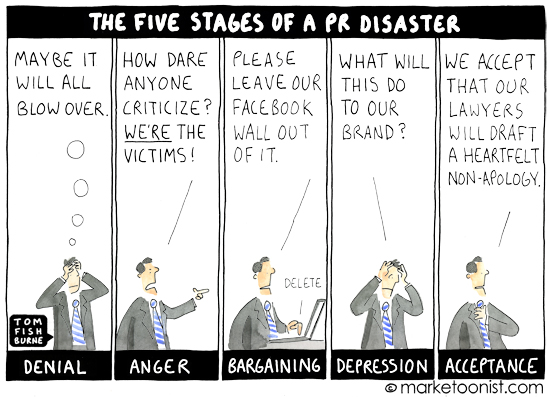It’s Friday night and right before you’re about to take off for a long weekend, the phone rings. There’s been a serious accident, or someone’s launched a massive petition against your product, or an employee is leveling accusations of harassment. Whatever it is, your company’s reputation is at stake and you need to do something pronto. Sound familiar? It seems like every time we read the news, yet another company is under fire for some sort of misdoing, be it yoga mat chemicals in Subway’s sandwiches or Target’s data breach.
At this year’s Seafood Expo, the keynote speaker was Daniel Diermeier of Northwestern’s Kellogg School of Management, addressing the crowd on reputation management. In a lively, action-oriented talk, he explained the new lay of the land in today’s media environment. The rise of social media means that the spread of information has intensified. “It takes less than 50 minutes on average for a story to make it once around the world,” explained Diermeier. “But just as quickly, we turn our attention to something else. Today, we’re concerned over the missing Malaysian plane. Two days later, it’s going to be Justin Bieber again.” For a typical news story, people pay attention to the event for 28 hours. What does that mean for companies? If you have a crisis and don’t respond within the window where people are paying attention, then your audience will just remember you as being unresponsive and guilty. Far from giving you enough time to investigate the situation and figure out who was at fault, today’s executives must respond to these challenges within a few hours, without getting all the facts. It’s an uncomfortable way to react.
So, what do you do? How do you take a crisis and turn it into an opportunity to increase trust from your customers, suppliers and partners? Diermeier explained that there are four factors that increase trust: transparency, empathy, commitment and expertise. Transparency goes beyond simply full disclosure, it’s about addressing all questions that your customers have in a way that makes sense to your customers. This is the tricky part because you have to understand your customers concerns and fears, even if you think they’re unfounded. For instance, many diners are worried about radiation in seafood from the Fukushima nuclear incident. When you talk to experts, there are negligible risks to eating Pacific seafood, however the fears are still there. “You cannot be transparent if you’re not understood,” said Diermeier.
Demonstrating expertise is another way to gain credibility in a subject matter, and this area is where companies excel. After all, they are the experts in their product and industry. However, when something goes awry, we automatically assume the company was negligent rather than making an honest mistake. When you hear that your data has been stolen at Target, the response is that Target should have done more to protect the data, not to feel sorry for Target as the victim of sophisticated hackers.
Commitment is about signaling that you’re going to find a solution. This is problematic because as discussed above, companies really only have 28 hours or so to respond, which is nowhere near enough time to resolve the situation. The best thing companies can do is to be present and show up. “When you go to a hotel and something’s wrong,” said Diermeier, “you want to hear from the general manager, not the person who cleaned the room.” Toyota made this error during their “stuck accelerator” crisis by not having their CEO take the lead. Instead, they chose the head of sales to be their public face, and as surveys have repeatedly shown that car salesmen are the least trusted profession in the US, this decision shows a dramatic mismatch between the public’s expectations and Toyota’s.
Finally, companies must show empathy, a connection with the audience’s feelings. Oftentimes companies believe they’ve done nothing wrong, so they aren’t empathetic. You may not feel the same emotions as your audience, but you need to connect with their concerns.
If you find your company the subject of a 60 Minutes investigation, the overarching strategy must be to plug the four factors above while telling a story. And what does every good story have? A hero, a villain and a victim. “Here’s the problem,” said Diermeier, “even though companies often feel like a victim, they are never perceived as a victim. So for companies, you can only be a hero or villain. We start out as the villain, and the only possible way out is to become the hero. What does the hero do? He saves the victim. You must thus identify the perceived victim and save them.” Whether the victim is whales, or families who have suffered from a food safety defect, you need to find a way to help them and save the day.
With the potential for information to go viral in a matter of minutes, it’s prudent for all companies to analyze what they do for crisis potential, so that they can be proactive in avoiding disasters. “Create the facts today that will be the basis for your story tomorrow, and use responsible business practices,” said Diermeier. It may be obvious, but it’s worth reminding ourselves that good, clean business is not something to compromise on.
